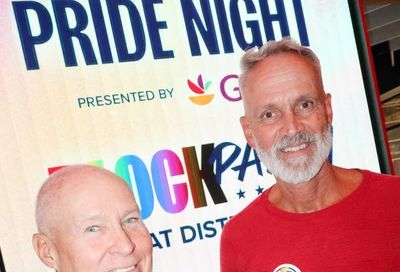Local nonprofits saddened by news that BHT Foundation will shut down
BHT Foundation filled a need for smaller nonprofits that are often overlooked by government or more established grants.

Following last week’s stunning announcement that the BHT Foundation, an organization that provided grants to support local LGBTQ and HIV-centric nonprofits in the D.C. and Baltimore regions, will dissolve in the coming months, former grantees expressed gratitude to the organization for its past help and sadness at the loss of one of the rare funding opportunities for smaller nonprofits.
“From the perspective of the LGBTQ+ community, it is a heart-wrenching reality that it is complicated for LGBTQ+ nonprofits, in any community throughout the country, to access dollars needed to be able to create a thriving space for LGBTQ+ people to live in,” Kris Fair, the executive director of the Frederick Center, and one of BHT’s 2021 grantees, told Metro Weekly.
“For an organization that specializes in supporting the work of LGBTQ+ communities to cease existing just further complicates and exacerbates the problem of getting funding into the LGBTQ community and at-risk, vulnerable populations. So it was a critical lynchpin organization that managed to get dollars where they needed to be and help smaller nonprofits do the hard work that they’re doing on the ground.”
Even though the Frederick Center had only had a relationship with BHT going back a year, Fair was immensely impressed with the way that the BHT Foundation had set up its grant application process.
“One of the really, really great things about BHT was that it had a streamlined grantee process, meaning that we were able to identify an exact need, and apply very quickly without having to provide an inordinate amount of information, like we would with larger granting organizations or federal government grants,” he said.
“We applied for their HIV support grant and it was a $5,000 grant to hire a facilitator to manage our HIV coalition. We built the coalition a couple of years ago with various partners from African-American sororities, different religious institutions, as well as the health department and the colleges out here. The coalition has been all volunteer-run, and we wanted to bring on a facilitator to help guide that group into its next iteration and growth period,” Fair added. “BHT made it a very clean and clear-cut process which made it a reality for us to be able to move forward and hire that part-time employee.”
Fair noted that the loss of the BHT Foundation means smaller nonprofits like the Frederick Center — barring an influx of private donations — now have more hurdles to go through to get grant money from other organizations, or have to seek out limited government funding to fund their initiatives and programs.
“BHT was a red tape-cutting organization that basically looked at getting funding directly into the organizations and individuals that are affecting change on the local level. They made it possible and functional for smaller nonprofits to be able to apply for funding and be able to get meaningful dollars in the door that could actually effect real change,” he said.
“When organizations like BHT cease to exist, small nonprofits like our have to go out into the larger granting community, which requires much more intensive records and much more follow-through after the grant has been distributed. And the application requirements that are associated with those grants are much stricter to even be considered a viable candidate. So that disproportionately impacts smaller nonprofits in the community.”
Related: BHT Foundation doles out more than $35,000 to local LGBTQ and HIV nonprofits
Paul Marengo, the BHT Foundation’s current president, said the organization has been forced to close down operations because it doesn’t have the infrastructure needed to continue.
“A lot of our board members sit on other boards or have been greatly impacted by COVID or have day jobs have become more demanding. And because our funds can only be used for granting, we don’t have dollars where we could hire an executive director to take on a lot of those responsibilities, which include everything from making sure our taxes are filed, to making sure that our two-year reports are done, to making sure that we’re in compliance with the federal government, to making sure that we promote our grant cycle and create the applications, along with fundraising, marketing, and all those other tasks that take a lot of time and energy,” he said.
“I’m one of the few board members who actually works in the nonprofit world, so getting volunteers in general has been an issue during COVID,” Marengo added. “A lot of volunteers I’ve worked with at my day job are typically situations like, ‘I want to come and I’m going to collect tickets’ or ‘I want to, you know, be a bartender at the bar,’ or ‘I want to greet’ or any number of positions where you just show up, do something and then you go home. A lot of the volunteers we need, there’s a longer commitment involved because the kind of work we need to get done.”
In December, the BHT Foundation’s board will meet to compile a short list of potential organizations who could benefit from the remaining money in BHT’s two investment funds and a third fund that was set up to assist youth-centric LGBTQ organizations and scholarship programs. While he’s not sure of the dollar amount, will determine at the December meeting how much is left in each fund, and, once it decides on a list of beneficiaries, BHT will begin writing checks to those nonprofits. He said the process of shutting down the organization completely will take about two to three months.
“Once the list of beneficiaries is finalized, we’ll discuss who will get how much,” Marengo said. “It’s like a giant jigsaw puzzle at this point.”

In terms of BHT’s legacy, Marengo notes that the organization had a good run for over 41 years, giving in excess of $3 million to local, smaller-scale LGBTQ and HIV nonprofits.
“We live in a region with the largest concentration of nonprofits, and a lot of times smaller organizations get overlooked because a lot of donors don’t think that because they’re not helping hundreds of thousands of people that they’re not making an impact,” Marengo said. “We have always believed that smaller organizations are making an impact because they are working on the ground, directly with people and communities, so they are really making a difference because they’re doing it at the grassroots level. So our legacy is is that we’ve given and supported our community for well over four decades, helping organizations that support the most vulnerable communities as best we can.”
Other beneficiaries noted that they had immensely benefitted from BHT’s generosity.
“BHT has been a source of support for so many queer and trans people for decades. Their support of the community has been instrumental in helping to uplift and empower our community,” Jorge Membreño, the deputy executive director of Supporting and Mentoring Youth Advocates and Leaders, said in a statement.
“SMYAL has been a proud recipient of BHT funding in the past,” Membreño added. “From helping to meet the most pressing needs of young people by supporting critical housing and healthcare to providing funding that bolsters LGBTQ youth activism for change, we are grateful for the solid foundation BHT has helped us establish on which we’ve been able to grow and expand.”

Cyndee Clay, the executive director of HIPS, a community harm reduction organization that supports communities affected by sex work and drug use, said she was saddened to learn of BHT’s forthcoming dissolution, calling it a
“huge loss to the community.”
“BHT has been one of HIPS’ longest funders, and their grants were such an amazing gift to the community,” Clay said. “The grants funded our hotline for many years, helped us buy much needed equipment, like computers and phones, that were hard to fund any other way. BHT even helped us buy at least one, if not more, of our outreach vans.
“While HIPS has grown and our dependence on grants the size that BHT gave has lessened, they were such a resource for smaller, LGBTQ organizations,” she added. “It’s incredible what the dedicated volunteers and clubs that made up BHT were able to do, from events, providing space for community, and the amount of grants they were able to give out. It’s like losing a long time friend, but we are so grateful and celebrate their accomplishments.”
Aditi Dussault, the president of DC’s Different Drummers, also expressed disappointment at the loss of a “longstanding partner” like BHT, which Dussault credited with providing the money necessary to help financially-struggling members of the D.C.-based musical entourage.
“The BHT funds were a little bit more flexible than like government-issued funds, so we were able to use them for member who are economically less well off to help cover their dues or other ways of participation in the organization, like instrument rental, things like repairs,” Dussault said. “We have band camp annually, and so if somebody wanted to attend band camp but couldn’t afford the extra fee associated with that, we have what’s called the Good Fairy Fund, and the funds supported that. I’m pretty sure we did buy some instruments with the money over time, like different percussion equipment and equipment rental, which makes for a better show.”
Dussault also noted that BHT had been a “consistent” source of funding for the bulk of the 15 years she’s belonged to the organization.
“Consistency is a big deal when you’re a nonprofit organization and know you’re having some funding come every year from different sources. DCDD has never had sponsorships from Fortune 1000 companies, it’s really been local businesses sponsoring us here and there,” Dussault noted. “There has been some support from local governments as of late, but this is a relatively new development, and politics can change. It was really nice to have a community organization, a community-based organization like BHT that served as a reliable source of funding. Particularly with a lot of the changes in the LGBTQ community in D.C. over the years, it’s sad to see another longstanding organization go.”
See also:
Trump sent gay lackey Richard Grenell to Serbia in “possibly illegal” trip
Anti-LGBTQ politicians top list of members of Glenn Youngkin’s transition team
White nationalists wipe feet on Pride flag at festival in Poland
Support Metro Weekly’s Journalism
These are challenging times for news organizations. And yet it’s crucial we stay active and provide vital resources and information to both our local readers and the world. So won’t you please take a moment and consider supporting Metro Weekly with a membership? For as little as $5 a month, you can help ensure Metro Weekly magazine and MetroWeekly.com remain free, viable resources as we provide the best, most diverse, culturally-resonant LGBTQ coverage in both the D.C. region and around the world. Memberships come with exclusive perks and discounts, your own personal digital delivery of each week’s magazine (and an archive), access to our Member's Lounge when it launches this fall, and exclusive members-only items like Metro Weekly Membership Mugs and Tote Bags! Check out all our membership levels here and please join us today!























You must be logged in to post a comment.